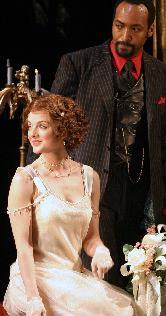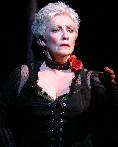SEARCH CurtainUp
REVIEWS
FEATURES
NEWS
Etcetera and
Short Term Listings
LISTINGS
Broadway
Off-Broadway
BOOKS and CDs
OTHER PLACES
Berkshires
London
LA/San Diego
Philadelphia
Elsewhere
QUOTES
On TKTS
LETTERS TO EDITOR
FILM
LINKS
MISCELLANEOUS
Free Updates
Masthead
NYC Weather
 Berkshire Review
Berkshire ReviewThe Three Penny Opera by Elyse Sommer
|
What in your opinion accounted for the success of 'Die Dreigroschenoper' ('The Three Penny Opera')? I'm afraid it was everything that didn't matter to me: the romantic plot, the love story, the music. And what would have mattered to you? The critique of society. ---An interview by Brecht with himself, c. 1933. He was a lean man. He was a mean man Lucy, one of the many women who allowed the lean, mean Macheath to walk right over them in "Barbara Song." |

Melissa Errico as Polly Peachum &Jesse L. Martin as Macheath
(Photo: Richard Feldman) |
Brecht and Weill adaptated their source material, John Gay's Beggar's Opera, for their own objectives -- Brecht to satirize the rife with corruption and poverty Weimar Germany; Weill to deconstruct Italian opera from what Samuel Johnson called "an exotic and irrational entertainment" into a musical entertainment for the masses. Their wildly successful collaboration has seeded many revivals which directors have tried to stamp with their own vision. These have ranged from using marionettes to moving the setting from corrupt Victorian London on the eve of Queen Victoria's coronation to more modern locales.

Betty Buckley as Jenny
(Photo: Richard Feldman)
|
The performances of the four main female characters -- Melissa Errico as an adorably tough Polly Peachum, Randy Graff as her even tougher mother, Betty Buckley as the wise and world-weary hooker Jenny Diver and Karen Ziemba as yet another woman in the anti-hero Macheath's life. Buckley and Ziemba don't show up until the second act, but they are so well worth waiting for that the fact that the first act is too jumpy and slows down whenever the music stops, is quickly forgotten.
While Jesse L. Martin looks dashing enough as the unscrupulous boss of thieves and exploiter of women, he doesn't invest the role with the nuances of charisma spiced menace it calls for. With his red shirt he conveys the sense that he would be more at home in Guys and Dolls. But, though the women rate the top singing and acting honors, there are enough standouts among the male contingent of the cast. David Schramm is perfection as Macheath's counterpart, the hypocritical capitalist who knows and uses every trick for turning the miseries of the poor into a profit and loosening the purse strings of the wealthy (selling begging licenses and the props like stumps and blind eyes to use them effectively). Laurent Giroux, as the splendidly sardonic Street Singer and narrator, exemplifies the strong support of the cast overall.
Peter Hunt, who has directed The Three Penny Opera before has now staged it with so much imagination that it sets up our expectations for the darker political aspects to be fully realized. A striking abstract opening image of Queen Victoria with a swastika earring and combination Scotland Yard officer-Hitler mustache brings to mind Sam Mendes' daringly reconceived Cabaret. John Conklin's starkly effective triple tiered set of iron scaffolding and stair cases allows James Sampliner's superb small orchestra to be strategically positioned on the middle level and bolsters that expectation, as does Rui Rita's lighting. If that anticipated coalescing of political drama, decadent passion and music isn't quite as successfully realized as the Mendes' vision for Cabaret, the way Hunt arranges the actors in vivid small groupings and a final jaw-dropping tableau of the full cast, there's enough here to make your ticket investment of considerably more than three pennies worthwhile.
The show works best when it's singing, and soars to stratospheric pleasure during the second act. That's when Buckley delivers her big, haunting "Pirate Jenny" (a reprise, really, since she played Jenny in Hunt's a previous WTF Threepenny). Also in Act two, there's Karen Ziemba's "Barbara Song" riff on men like Mack the Knife and her terrific and humorous "Jealousy Duet " with Errico. This is also solo time for Graff with "Ballad of Dependency."
Since my first love affair with this popera during its Theatre de Lys incarnation, New York has mounted revivals at twelve to fifteen year intervals. As if proof was needed of the enduring appeal of the story and, most especially the music, this fall will see not one but two productions -- one on Broadway under the auspices of the Roundabout Theater and one Off-Broadway from the Cocteau Repertory Theater Company. Clearly there's plenty of life left in this dark and witty musical that for all its dissonance sends people out of the theater humming "Mack the Knife."
| THE THREEPENNY OPERA By Bertolt Brecht and Kurt Weill Based on English adaptation by Marc Blitzstein of John Gay's The Beggar's Opera. Directed by Peter Hunt Street Singer: Laurent Gioux Mr. J.J. Peachum: David Schramm Mrs. Peachum: Randy Graff Filch: William Duell Polly Peachum: Melissa Errico Macheath: Jesse L. Martin Jenny: Betty Buckley Reverend Kimball: Stephen Gabis Tiger Brown: Jack Willis Smith: Kenneth Garner Lucy Brown: Karen Ziemba Ready-Money Matt: Jim Stanek Crook-Finger Jake: Jack Noseworthy Bob the Saw: Julio Monge Walt Dreary: John EllisonConlee Betty: Kathy McCafferty Dolly: Sarah Knowlton Molly: Rachel Siegel Coaxer: Kelly Brady Constable 1: James McMenamin Constable 2: Frank Faucette Beggar: Michael Crane Beggars: Matthew Bailey, Nikki Berger, Stefani Katarina Cvijetic, Gus Danowski, John Forest, Claire Turner French, Charlie Hudson III, Abby Huston, Bianca LaVerne Jones, Nancy McNulty, Ana Isabel Mercado, Susan Myhr, Jaquelyn Marie Phillips, Godfrey Plata, Amina Robinson, Jonathan Silver, Scott Sweatt, Nick Thomas, Baron Vaughn, Audrey Lynn Weston. Sets: John Conklin Costumes: Laurie Churba Lighting: Rui Rita Sound: Kurt B. Kellenberger Orchestra: Conductor/James Sampliner; Percussion/Damien Bassman; Trombone/Ernest Clark; Guitar, Banjo/Robert Ferrier; Reed I/Ron Lively; Reed II/Bruce Krasin; Piano, celeste & harmonium/Thomas Matthew Richardson Running Time: 3 Hours with 2 intermissions (Acts 1 & 2 60 minutes each; Act 3, 30 minutes June 25 -- July 6, 2003 Tuesday through Friday, 8:30 p.m. Saturday; matinees, 4 p.m. Saturday, 2 p.m. Sunday Tickets: $20-$53 1000 Main Street, Williamstown, MA (413/597-3400) web address 6/25/03-7/06/03 Review by Elyse Sommer based on 6/28 performance |
|
Musical Numbers
Surabaya Johnny, from Happy End (1929), with the music by Kurt Weill, lyrics by Bertold Brecht, and in the English translation by Michael Feingold, is interpolated in the stable scene under special license from European American Music Corporation on behalf of Stefan Brecht and the Kurt Weill Foundation for Music, Inc. | ||
Act One
|
Act Two
|
Act Three
|



6,500 Comparative Phrases including 800 Shakespearean Metaphors by CurtainUp's editor.
Click image to buy.
Go here for details and larger image.
